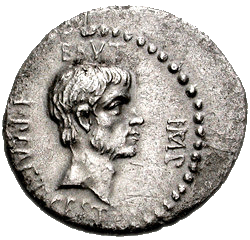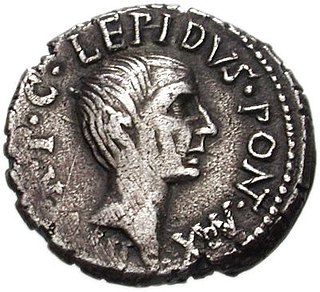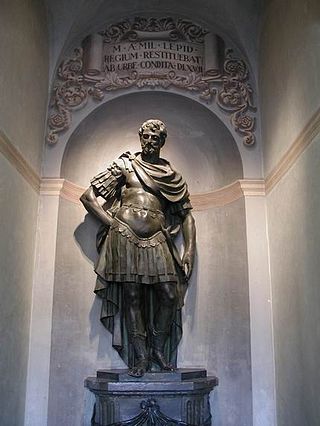
Gaius Julius Caesar Augustus, also known as Octavian, was the founder of the Roman Empire; he reigned as the first Roman emperor from 27 BC until his death in AD 14. The reign of Augustus initiated an imperial cult as well as an era associated with imperial peace, the Pax Romana or Pax Augusta, in which the Roman world was largely free of armed conflict aside from expansionary wars and the Year of the Four Emperors. The Principate system of imperial rule established by Augustus lasted until the Crisis of the Third Century.

Marcus Antonius, commonly known in English as Mark Antony, was a Roman politician and general who played a critical role in the transformation of the Roman Republic from a constitutional republic into the autocratic Roman Empire.
Year 43 BC was either a common year starting on Sunday, Monday or Tuesday or a leap year starting on Sunday or Monday of the Julian calendar and a common year starting on Monday of the Proleptic Julian calendar. At the time, it was known as the Year of the Consulship of Pansa and Hirtius. The denomination 43 BC for this year has been used since the early medieval period, when the Anno Domini calendar era became the prevalent method in Europe for naming years.

This article concerns the period 49 BC – 40 BC.
This article concerns the period 79 BC – 70 BC.

Marcus Junius Brutus was a Roman politician, orator, and the most famous of the assassins of Julius Caesar. After being adopted by a relative, he used the name Quintus Servilius Caepio Brutus, which was retained as his legal name. He is often referred to simply as Brutus.
Year 46 BC was the last year of the pre-Julian Roman calendar. At the time, it was known as the Year of the Consulship of Caesar and Lepidus. The denomination 46 BC for this year has been used since the early medieval period, when the Anno Domini calendar era became the prevalent method in Europe for naming years.
Year 13 BC was either a common year starting on Friday, Saturday or Sunday or a leap year starting on Friday or Saturday of the Julian calendar and a leap year starting on Wednesday of the Proleptic Julian calendar. At the time, it was known as the Year of the Consulship of Nero and Varus. The denomination 13 BC for this year has been used since the early medieval period, when the Anno Domini calendar era became the prevalent method in Europe for naming years.

Year 77 BC was a year of the pre-Julian Roman calendar. At the time it was known as the Year of the Consulship of Brutus and Lepidus. The denomination 77 BC for this year has been used since the early medieval period, when the Anno Domini calendar era became the prevalent method in Europe for naming years.

Year 216 BC was a year of the pre-Julian Roman calendar. At the time it was known as the Year of the Consulship of Varro and Paullus. The denomination 216 BC for this year has been used since the early medieval period, when the Anno Domini calendar era became the prevalent method in Europe for naming years.
Year 232 BC was a year of the pre-Julian Roman calendar. At the time it was known as the Year of the Consulship of Lepidus and Melleolus. The denomination 232 BC for this year has been used since the early medieval period, when the Anno Domini calendar era became the prevalent method in Europe for naming years.

The Second Triumvirate was an extraordinary commission and magistracy created for Mark Antony, Lepidus, and Octavian to give them practically absolute power. It was formally constituted by law on 27 November 43 BC with a term of five years; it was renewed in 37 BC for another five years before expiring in 32 BC. Constituted by the lex Titia, the triumvirs were given broad powers to make or repeal legislation, issue judicial punishments without due process or right of appeal, and appoint all other magistrates. The triumvirs also split the Roman world into three sets of provinces.

Marcus Aemilius Lepidus was a Roman general and statesman who formed the Second Triumvirate alongside Octavian and Mark Antony during the final years of the Roman Republic. Lepidus had previously been a close ally of Julius Caesar. He was also the last pontifex maximus before the Roman Empire, and (presumably) the last interrex and magister equitum to hold military command.

Sextus Pompeius Magnus Pius, also known in English as Sextus Pompey, was a Roman military leader who, throughout his life, upheld the cause of his father, Pompey the Great, against Julius Caesar and his supporters during the last civil wars of the Roman Republic.

Marcus Aemilius Lepidus was a Roman consul, Pontifex Maximus, Censor and Princeps Senatus. A scion of the ancient Patrician gens Aemilia, he was most likely the son of Marcus Aemilius Lepidus, with his brothers being Lucius and Quintus.

The senatus consultum ultimum is the modern term given to resolutions of the Roman Senate lending its moral support for magistrates to use the full extent of their powers and ignore the laws to safeguard the state.
Marcus Aemilius Lepidus was a Roman statesman and general. After the death of Lucius Cornelius Sulla, he joined or instigated a rebellion against the Sullan regime, demanding a consecutive term as consul late in his year and, when refused, marching on Rome. Lepidus' forces were defeated in a battle near the Milvian Bridge and he fled to Sardinia. He was the father of the triumvir Lepidus and of the Lucius Aemilius Lepidus Paullus who was consul in 50 BC.
Marcus Junius Brutus was a plebeian tribune of the Roman Republic in 83 BC and the founder of the colony in Capua. He was an associate of Marcus Aemilius Lepidus, who led a revolt against the senate after the death of Sulla. He was captured by Pompey and treacherously executed. He was the father of a homonymous son, who assassinated Julius Caesar in 44.

The constitutional reforms of Augustus were a series of laws that were enacted by the Roman Emperor Augustus between 30 BC and 2 BC, which transformed the Constitution of the Roman Republic into the Constitution of the Roman Empire. The era during which these changes were made began when Augustus defeated Mark Antony and Cleopatra at the Battle of Actium in 31 BC, and ended when the Roman Senate granted Augustus the title "Pater Patriae" in 2 BC.
The War of Mutina was a civil war between the Roman Senate and Mark Antony in Northern Italy. It was the first civil war after the assassination of Julius Caesar. The main issue of the war were attempts by the Senate to resist Antony's forceful assumption of the strategically important provinces of Transalpine and Cisalpine Gaul from their governors. The Senate, led by Cicero and the consuls, attempted to woo Julius Caesar's heir to fight against Antony. Octavian, however, would pursue his own agenda.










